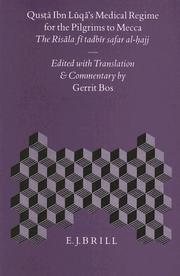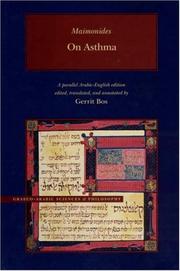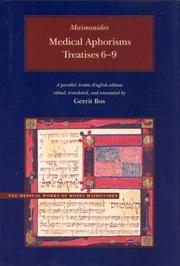| Listing 1 - 10 of 16 | << page >> |
Sort by
|

ISSN: 01698729 ISBN: 9004095411 9004451153 9789004095410 9789004451155 Year: 1992 Volume: 11 Publisher: Leiden Brill
Abstract | Keywords | Export | Availability | Bookmark
 Loading...
Loading...Choose an application
- Reference Manager
- EndNote
- RefWorks (Direct export to RefWorks)
This work by Qusṭā Ibn Lūqā, the only known health guide for the pilgrim to Mecca, discusses in a concise and logical manner the best regime for the traveller, the diseases which may befall him and their treatment. It is an eloquent witness to the author's profound knowledge of the works of ancient physicians, especially those of the Byzantine physician Paul of Aegina. After an exposition of the best regimen for the traveller, Qusṭā mentions the different diseases which may befall him, namely, fatigue, earache, diseases of the bronchial tubes and those caused by dust. Recommended remedies are simple and compound drugs, bathing and massage. Qusṭā then discusses criteria to determine the quality of water, means to improve bad water, and means to quench one's thirst. In the next chapters Qusṭā treats the prophylaxis against vermin and the treatment of stings and bites caused by them. After a lucid exposition of spontaneous generation, Qusṭā concludes his treatise by discussing the occurrence of the Dracunculus medinensis and its treatment.
Arab medicine --- Geneeskunde [Arabische ] --- Medecine arabe --- Medicine [Arab ] --- Medicine [Arabic ] --- Medicine, Arab. --- Travel --- Muslim pilgrims and pilgrimages --- Health aspects --- Handbooks, manuals, etc. --- Early works to 1800 --- Mecca (Saudi Arabia) --- Medicine, Arabic. --- Travel - Health aspects - Handbooks, manuals, etc. - Early works to 1800. --- Muslim pilgrims and pilgrimages - Health aspects - Saudi Arabia - Mecca - Early works to 1800. --- Medicine, Arab --- Traveling --- Travelling --- Islamic pilgrims and pilgrimages --- Pilgrims and pilgrimages, Muslim --- Medicine, Arabic --- Medicine, Unani --- Tibb (Medicine) --- Unani medicine --- Unani-Tibb (Medicine) --- Health aspects&delete& --- Handbooks, manuals, etc --- Tourism --- Voyages and travels --- Medicine, Medieval --- Muslim travelers --- Pilgrims and pilgrimages
Periodical
Year: 2004 Publisher: Provo Brigham Young University Press
Abstract | Keywords | Export | Availability | Bookmark
 Loading...
Loading...Choose an application
- Reference Manager
- EndNote
- RefWorks (Direct export to RefWorks)
Book
ISBN: 2503044476 2503044484 9782503044477 Year: 2001 Volume: 144C 4, pars 4 Publisher: Turnhout Brepols
Abstract | Keywords | Export | Availability | Bookmark
 Loading...
Loading...Choose an application
- Reference Manager
- EndNote
- RefWorks (Direct export to RefWorks)
Astronomy --- Esoteric sciences --- Astrology --- Astrology, Arab --- Astronomy, Ancient --- Astronomy, Arab --- Astrologie --- Astrologie arabe --- Astronomie ancienne --- Astronomie arabe --- Early works to 1800 --- Ouvrages avant 1800 --- Astronomie ancienne. --- Divination --- 273.1*33 --- 230.005 --- Corpus hermeticum --- Religion Christian theology Serial publications --- 273.1*33 Corpus hermeticum --- Astrologie - Ouvrages avant 1800 --- Divination - Ouvrages avant 1800.

ISSN: 15376672 ISBN: 9780842526906 0842524754 Year: 2002 Volume: *4 Publisher: Provo Brigham Young university press
Abstract | Keywords | Export | Availability | Bookmark

ISBN: 9780842527804 084252780X 9780842526647 0842528768 0842526641 0934893756 9780934893756 9780842528436 0842528431 9780842528764 Year: 2007 Publisher: Provo Brigham Young university press
Abstract | Keywords | Export | Availability | Bookmark
 Loading...
Loading...Choose an application
- Reference Manager
- EndNote
- RefWorks (Direct export to RefWorks)
Maimonides, one of the most celebrated rabbis in the history of Judaism, was a prolific author of influential Arabic philosophical and medical treatises and two of the most important works on Jewish law. Medical Aphorisms is the best known and most comprehensive of his works, and Gerrit Bos offers here a masterful English translation with detailed annotations.Medical Aphorisms consists of approximately 1500 maxims compiled by Maimonides from the treatises of Galen, the renowned ancient Greek physician. Maimonides arranges the aphorisms into twenty-five treatises, organizing them by traditional medieval subspecialties such as gynecology, hygiene, and diet. He also includes a section examining unusual cases from Galen and offers a critical analysis of Galen’s theories.
Aphorisms and proverbs --- Medicine --- Aphorisms --- Philosophy
Book
ISBN: 9789004183100 Year: 2010 Volume: 40 Publisher: Leiden Brill
Abstract | Keywords | Export | Availability | Bookmark
 Loading...
Loading...Choose an application
- Reference Manager
- EndNote
- RefWorks (Direct export to RefWorks)
Gems --- Medicine, Medieval --- Magic. --- Lapidaries (Medieval literature) --- 691.2 --- 296*62 --- Magick --- Necromancy --- Sorcery --- Spells --- Occultism --- Medieval medicine --- Gems (in religion, folk-lore, etc.) --- Natural stones. Other mineral materials --- Joodse theologie en filosofie in de middeleeuwen --- Berechiah ben Natronai, --- 296*62 Joodse theologie en filosofie in de middeleeuwen --- 691.2 Natural stones. Other mineral materials --- Magic
Book
ISBN: 9780521115490 0521115493 Year: 2011 Volume: 47 Publisher: Cambridge Cambridge university press
Abstract | Keywords | Export | Availability | Bookmark
 Loading...
Loading...Choose an application
- Reference Manager
- EndNote
- RefWorks (Direct export to RefWorks)
"In this forgotten treatise, preserved largely in medieval translations into Arabic and Latin, the greatest medical scientist of antiquity investigates the relationship between conscious and unconscious movements. He looks at the structure of the tongue and the oesophagus, and asks why mental perceptions can have physical effects on the body. Some of his questions still trouble modern scientists, although they would not accept most of his answers. The extensive Introduction and Commentary explain the medical background for non-medical specialists, and discuss the place of this treatise and of anatomy in medieval medicine down to Leonardo da Vinci. As well as being the first English translation of this important work, this is also the first comparative study of medieval translations of the same ancient text, and is based on new editions and collations of all three. The Commentary pays special attention to the linguistic elements involved in making these translations"--Provided by publisher.
Kinesiology --- Human mechanics --- Human anatomy --- Medicine, Medieval. --- Cinésiologie --- Mécanique humaine --- Anatomie humaine --- Médecine médiévale --- Early works to 1800 --- Early works to 1800. --- Ouvrages avant 1800 --- Medicine, Greek and Roman --- Cinésiologie --- Mécanique humaine --- Médecine médiévale --- Medicine, Medieval --- Medieval medicine --- Cinesiology --- Motor ability --- Body mechanics, Human --- Human biomechanics --- Human movements --- Movements, Human --- Animal mechanics --- Human physiology --- Physical anthropology --- Human mechanics - Early works to 1800 --- Kinesiology - Early works to 1800 --- Human anatomy - Early works to 1800
Book
ISBN: 900428222X 9789004282223 9789004282216 9004282211 1322348936 Year: 2015 Publisher: Boston
Abstract | Keywords | Export | Availability | Bookmark
 Loading...
Loading...Choose an application
- Reference Manager
- EndNote
- RefWorks (Direct export to RefWorks)
Galen's impact on Islamic civilization, mainly on medicine but also on physics and philosophy, was enormous. His most important books were mediated through 'summaries' which not only shortened, but in some cases also revised Galenic teachings. Several versions of these summaries exist, and their appreciation is critical for a proper understanding of the development of medieval science. This book presents the first editions, translations, and studies of the remaining summaries to On Critical Days . In Galenic theory, fevers develop towards a crisis which will determine the fate of a patient. The cycle of crisis is known through observation, but the search for the cause leads Galen and his later interpreters into the fields of astrology, arithmology, and more.
Prognosis --- Medicine, Greek and Roman. --- Medicine, Arab. --- Medical astrology --- Astrodiagnosis --- Astrology and medicine --- Astrology --- Medicine, Magic, mystic, and spagiric --- Arab medicine --- Medicine, Arab --- Medicine, Arabic --- Medicine, Unani --- Tibb (Medicine) --- Unani medicine --- Unani-Tibb (Medicine) --- Medicine, Medieval --- Greek medicine --- Medicine, Roman --- Roman medicine --- Medicine, Ancient --- Medical prognosis --- Prognosis of diseases --- Forecasting --- Diagnosis --- Galen. --- Γαληνος.
Book
ISBN: 9789004406445 Year: 2019 Publisher: Leiden Boston Brill
Abstract | Keywords | Export | Availability | Bookmark
 Loading...
Loading...Choose an application
- Reference Manager
- EndNote
- RefWorks (Direct export to RefWorks)
The authors publish a previously unedited Regimen of Health attributed to Avenzoar (Ibn Zuhr), translated at Montpellier in 1299 in a collaboration between a Jewish philosopher and a Christian surgeon, the former translating the original Arabic into their shared Occitan vernacular, the latter translating that into Latin. They use manuscript evidence to argue that the text was produced in two stages, first a quite literal version, then a revision improved in style and in language adapted to contemporary European medicine. Such collaborative translations are well known, but the revelation of the inner workings of the translation process in this case is exceptional. A separate Hebrew translation by the philosopher (also edited here) gives independent evidence of the lost Arabic original.
Book
ISBN: 9780842527897 0842527893 Year: 2012 Volume: *6 Publisher: Provo Brigham Young University Press
Abstract | Keywords | Export | Availability | Bookmark
 Loading...
Loading...Choose an application
- Reference Manager
- EndNote
- RefWorks (Direct export to RefWorks)
History of medicine --- Internal medicine --- Hemorrhoids. --- Hemorrhoids --- Medieval --- 1096-1438 a.d. --- Gastro-enterology --- diet therapy --- Gastro-enterology. --- diet therapy. --- Diet therapy.
| Listing 1 - 10 of 16 | << page >> |
Sort by
|

 Search
Search Feedback
Feedback About UniCat
About UniCat  Help
Help News
News